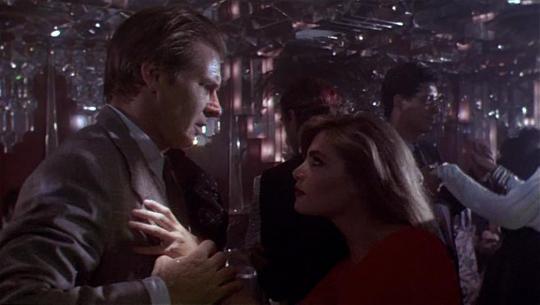 Almost everything in this shot has a dark lighting which shows the dismal and uneasy feeling of the movie, but the highlight of the shot is Michelle's hand resting on Walkers chest and his hand grasping her wrist going to move it that is what the director wants the audience to focus on. Walkers face is serious and apprehensive, while Michelle's is calm and alluring. This shot is a perfect representation of the sexual tension that is seen throughout the movie between these two. The camera proximity is social which is appropriate because it makes this moment less intense as opposed to the option of having a close up on their hands. The frame is a mix between loose and tight Michelle's side of the shot has a little room showing that she is in a position to move about. While Walkers side of the shot has him partially cut out showing that he is trapped and has no place to go. So this shot perfectly shows one of the most important elements of his psychological entrapment, sexual tension.
Almost everything in this shot has a dark lighting which shows the dismal and uneasy feeling of the movie, but the highlight of the shot is Michelle's hand resting on Walkers chest and his hand grasping her wrist going to move it that is what the director wants the audience to focus on. Walkers face is serious and apprehensive, while Michelle's is calm and alluring. This shot is a perfect representation of the sexual tension that is seen throughout the movie between these two. The camera proximity is social which is appropriate because it makes this moment less intense as opposed to the option of having a close up on their hands. The frame is a mix between loose and tight Michelle's side of the shot has a little room showing that she is in a position to move about. While Walkers side of the shot has him partially cut out showing that he is trapped and has no place to go. So this shot perfectly shows one of the most important elements of his psychological entrapment, sexual tension.Polanski made Frantic into a perfect noir nightmare, the psychological thriller shows many aspects of noir elements such as violence, fear, anxiety, isolation, moral ambiguity, disorientation, loneliness, and sexual tension. All of these elements help produce the sense of entrapment that Dr. Walker must be feeling. These are the feelings and actions that lead Richard to feel a sense of responsibility for both Michelle and his Wife. They are the reason why he keeps putting himself in potentially life threatening situations from which he cannot safely remove himself.
Michelle, is such an important part of this movie she plays the role of the femme fatal supporting sexual tension as well as the sense of moral ambiguity. She is the temptress for Dr. Walker ,even though he loves his wife which he shows in his desperation to find her,. Her appeal is obviously one of sexuality, she is extremely attractive and she is very tempting but there is more to it. I think that Walker identifies with her because she is lost as well. I feel like this appeals to Walker because he is lonely himself in an unfamiliar place which leads to his feelings of loneliness and disorientation. Walker is forced to deal with her troubles as well as the sexual tension she creates, which makes everything more interesting to say the least. And she does not make the task of finding his wife any easier but he takes her in simply because she literally refuses to leave his side. which all adds to the feeling of entrapment.
Dr. Richard Walker is very far from home, he can not communicate because he does not know how to speak the language, and his wife is missing. This is a scenario built to make one feel disoriented. Firstly he is in a foreign country he does not know the area so this present the obstacle of not knowing where to begin which is overwhelming in itself. This also adds on to his mounting anxiety about his wife who he has lost and is on a mission to find. She was his lifeline she spoke French and knew the agenda so every time something goes wrong or he doesn’t know how to communicate it is just another reminder that his wife is gone and he is alone. He realizes that he has been thrown into a world where no one cares about his privilege and no one is going to give him any special treatment. He is in Paris and he knows no French, this adds on to his sense of isolation and helplessness. This also shows you how his feelings of entitlement is very important in his feeling of disorientation as well. He goes into another country not knowing the native tongue but expecting people to understand him. He quickly learns though the this will not be the case. All of these elements lead to Dr. Walkers extreme feelings of psychological entrapment. Leaving him anxious, isolated, and alone.
